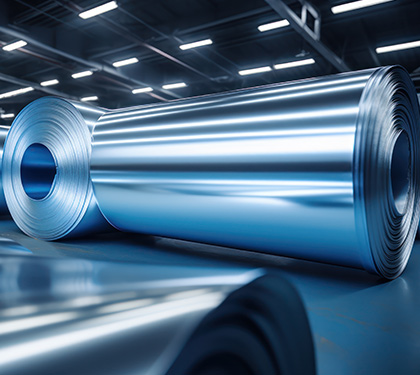Aluminum is Indispensable for the Energy Sector

The aluminum market is growing in Turkey and the world. Interest in aluminum products is increasing day by day. Aluminum is preferred in various production areas due to its many features such as low carbon emissions, light weight, softness, corrosion resistance and recyclability.With these advantages, aluminum is used in various industries such as transportation, aviation, automotive, defense, packaging, architectural decoration, construction and health. Described as a "green metal", aluminum also provides environmentally friendly and sustainable products. Aluminum is also a strategic raw material for the electricity sector. Aluminum-based products are used in many applications for electricity generation and transmission, renewable energy and energy storage.
Aluminum Can Be Recycled Over and Over Again
Aluminum is of indispensable value in industry due to its recyclable nature. Significant energy savings can be achieved by recycling primary aluminum. This can be achieved by saving 95 percent of the energy required to produce aluminum. With the right technologies, aluminum can be melted repeatedly and turned into new products without any loss of quality. With all these aspects, it is among the indispensable products of many sectors, especially construction. Zahit Alüminyum, one of the most prestigious companies in Turkey with its production, employment and exports in its facilities in Adana Hacı Sabancı Organized Industrial Zone, explained why aluminum is widely used in the energy sector.
The Need for Aluminum Increases Day by Day
The proliferation of human-induced greenhouse gas emissions in the atmosphere leads to climate change. With industrialization all over the world, HFC, N2O, CO2, PFC, etc. gases that cause greenhouse gas effect in the atmosphere are increasing.
In order to prevent the global climate crisis, conservation of natural resources, effective waste management, energy efficiency, low carbon emissions, recycling/recovery and sustainability-oriented approaches are becoming increasingly meaningful. In this context, the demand/need for aluminum, known as "green metal", is growing day by day. Research shows that aluminum has led to significant reductions in the "carbon footprint", which refers to the amount of carbon emitted into the atmosphere during transportation, heating and energy consumption. In all countries, the shift away from petroleum products in transportation and towards electric vehicle production and renewable energy sources is accelerating in order to reduce the carbon footprint.
Aluminum is Used in the Energy Sector
Aluminum, a versatile element, is widely used in the energy sector due to its low loss and high conductivity, corrosion resistance that prevents oxidation, wear and corrosion, and its economic, safe, lightweight and durable qualities. The use of aluminum in the electricity sector contributes to a sustainable energy infrastructure by increasing the efficiency of energy transmission and storage systems. Some of the uses of aluminum in the electrical-electronics sector can be listed as follows: Power transmission lines, motors, heating elements, busbars, cables, coolers, windings, electric vehicles and batteries (washing machines, dryers, refrigerators, laptops and telephones), transformer windings, generators and energy storage systems.
Preferred in the Renewable Energy Sector
Renewable energy sources, which are becoming more and more important due to global climate change, aim for environmentally friendly and sustainable energy production. Within the framework of renewable and modern energy applications, aluminum-containing solar panels and electric vehicle charging stations are in great demand.
Thanks to its light weight, corrosion resistance, low density and excellent strength, aluminum is used extensively in the frames of solar panels and in the construction of wind turbines. It is also preferred in hydroelectric power plants because it is resistant to the effects of water and provides high strength. Aluminum makes energy transmission over long distances more economical due to its economic cost. It ensures that batteries designed for energy storage in renewable energy systems are light and long-lasting in production.
Benzer Haberler

03
Temmuz
Special Solutions for Special Places from Zahit Aluminium


03
Temmuz
How is Sustainability Ensured at Zahit Aluminium?


03
Temmuz
Folding Aluminium Window and Door Models and Prices


03
Temmuz
Advantages and Prices of Aluminium Window and Door Systems


